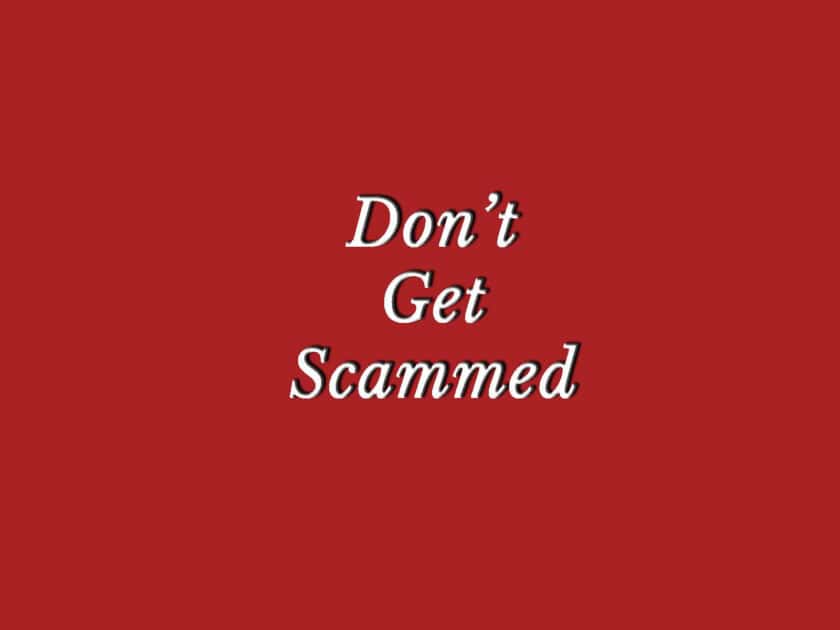This post may contain affiliate links. If a product or service is purchased using a link(s) in the post below a small commission may be earned.
Last updated on July 5th, 2024 at 10:58 am
I thought I’d share a few useful tips on how not to get scammed. It doesn’t matter if you are a content creator or a regular user of the internet. It’s always good to try to stay safe online.
For content creators
Let’s face it as content creators we may be contacted on a daily basis. Some may be for collaborations or to be sold a product or a service.
With so many scams going around lately, you may not know what is true and what is fake.
Here are a few tips to consider when trying to filter out legitimate offers from the scams.
For services emails
If you are sent emails for services such as followers, marketing, or even website auditing (fixing errors, speeding up a site, etc.)
Always check the websites to see how old they are or even if they are valid.
One easy way to do this is to copy the domain from the email. This would be after the @(at) symbol.
For example, it would be @(at) example.com. you can copy the example.com and paste it into your favorite search engine. You can add the word scam or legit after it if you think it’s needed.
Another favorite tool of mine is to visit Whois. They offer free public info. So you can paste the URL into the search bar and it will tell you the age of the site and its hosting info.
For Collaboration or promotions
Some of these types of emails may be harder to determine. But here are a few things you should take into consideration.
Always check the sender’s email
This is a big one. If you are contacted out of the blue by a popular brand always check the email it’s sent from.
Many brands (at least larger ones) have their own branded email. So if you are sent one from a free service such as Gmail, Yahoo or others always think twice.
you can also double-check to see if the email is valid by reaching out to the brand. This can be done via social media or the brand’s site.
At the time of writing this, the top collab scams feature Fashion Nova or Shein.
If the offer sounds too good to be true
Some of these collaboration or promo emails may sound very appealing because they offer large payouts or payouts for doing nothing.
What I mean by nothing is one of the scams claims they will pay you just for sharing about the box you were sent. No one is going to pay you thousands of dollars just to show a box and not the contents.
Also if the brand claims you will earn more money the more you share take that as a red flag.
If the payout is large and they request you to set up a bank transfer also find this suspicious.
Check Grammar, spelling, ETC.
As with many scams, you can check for spelling and grammar errors. If a sentence doesn’t seem to make sense or if a word is missing think twice.
If you’re asked to pay a fee
Some promotional or sales offers may ask you to pay a fee such as shipping for products. This isn’t typical of any well-known brand. If they reach out to you they don’t charge you for the pr box or even shipping fees.
For instance, if a brand sends you out a promotional email and they want you to share 10 products but you have to pay $25 USD for shipping it’s a scam. No company should charge you to share their products or content if they reached out to you.
content creation
Now that UGC (User generated content) is the new trend many brands may reach out for short videos, photos, etc.
like with the previous sections, you can double-check to make sure the request is from a real brand. If they want to give you a free product for a video or image you are free to ask for more. You should also ask what the terms of usage are.
For website owners
If you run your own website or even if you have one via WordPress.com or another free site service you may count too.
Many of us have various emails for site help or promotions.
Website updates or help services
No matter where you have your website you may be sent these emails. The sender usually wants to share with you how to speed up your website or how they can help stop errors.
But remember if you are using a hosting provider such as Bluehost, siteground, or others your provider has free help you can use.
Also, many of these are very vague in terms of if it’s a company or an individual who is a tech support agent. Some signed consultant and a name.
marketing emails
We may be bombarded with marketing emails. I get some that make me laugh.
Affiliate marketing emails
These may be common for website owners. But always check the sender’s info. I always check the companies as well.
I’ve been getting a number of supplement emails lately. So I always check the brands and where they can be found.
If the brand is affiliated with a marketing platform check them out. I also run a search on the company as well to see what users have to say about it.
You can also use Whois to learn more about the company too.
Collaborations and promotions
These are similar to what I shared in the content creator section. You can do a search about the brand and check whois.
You can also make sure the email is legit by checking for branded email addresses. if anything feels off always contact the brand directly.
requesting ad space is another one. I had a company email me this week trying to see if I would promote their supplements.
I looked into the brand but they are based outside of the US. I don’t usually promote selling ad space either so it was an odd email.
For all Internet users
There are scams we see often so let’s try not to get scammed.
giveaway or sweepstakes
Remember if you haven’t entered anything you haven’t won anything. If you are sent an email stating you’ve won a prize or a lottery don’t believe it.
You can do an online search for the prize you won to see if it’s a scam.
Job offers
If you use job boards many companies may reach out to you via email. Always beware if the email states you applied for a position. If you haven’t applied for anything be suspicious.
If the job offer is too good to be true such as high pay for little work.
Again you can search online for the job or the email associated with it.
Tech support
This is one of the most common scam emails people are sent. Again if you haven’t submitted a support ticket to any service provider it’s a scam.
If you are sent a payment due notice for a product you don’t use it’s a scam.
You can do an online search for the product or service that is billing you just to be safe.
You can also check out our other scam posts by searching the word scam in our search bar. I hope this post helps you keep from getting scammed.






